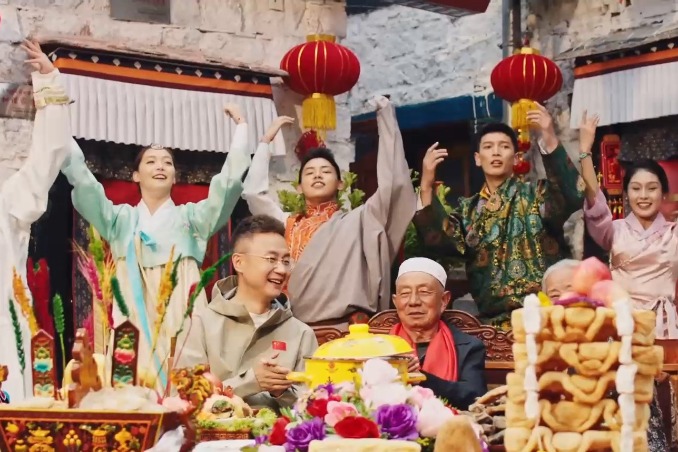Maoqiang Opera stages a revival
Traditional folk art poised for encore with increasing support, An Baijie reports in Rizhao, Shandong.

Mo Yan, who won the 2012 Nobel Prize in Literature, grew up watching Maoqiang Opera in his hometown in Shandong province, and even featured the traditional folk art in one of his novels.
"It was so popular in the 1950s and '60s that when a troupe came to my village, everyone would stop everything and rush to secure a seat. If a famous performer was due, the show would sell out many days in advance," Mo told a session of national political advisers in 2015.
Maoqiang Opera developed from local folk songs and first gained popularity in the 1860s. It originated in the Jiaozhou area of the Jiaodong Peninsula in East China. As it developed, it absorbed arias and local art forms, such as the flower drum dance and the yangko (a popular folk dance).
In 2006, Maoqiang Opera was included on the national intangible cultural heritage list. Mo Yan's novel, Sandalwood Death, is written in the Maoqiang Opera style and an English translation was published in 2013.
Over the past century, the art form has faced challenges including shrinking audiences, a dearth of performers from the younger generation, and a shortage of public funds.
But things are looking up under nationwide measures to revive the traditional arts — Maoqiang Opera itself is gaining new momentum in line with sustainable development in Shandong's Wulian county, with support from the public and private sectors.
Audience enthusiasm
Wang Jinxia, the 37-year-old deputy director of the Wulian New Era Maoqiang Art Troupe, started studying Maoqiang Opera under her cousin at 19 after graduating from high school. Initially, her parents did not support her decision.
"Just like most parents who want their children to have a bright future, my dad and mom didn't think opera was a promising job," she says.
But Wang did not give up. Beginning in the winter of 2006, she practiced at least an hour a day and subsequently became a full-time performer at the government-funded Wulian County Maoqiang Opera Troupe in 2013. Seven years later, she was invited to join the privately run Wulian New Era Maoqiang Art Troupe.
Wang says that she is glad that more young people are becoming fond of folk art, with many choosing to study the opera. Nearly half of the 42 members of the New Era troupe are under the age of 35 and its youngest performer, Xu Ting, was born in 2002.
Sun Hongju, a national first-class opera performer and director of the Wulian New Era Maoqiang Art Troupe, says she has been deeply moved many times by the enthusiasm of the audience.
"One day when we were about to perform, it started drizzling. We planned to postpone the performance, but when I turned around and saw the audience sitting under umbrellas, waiting eagerly, we decided then and there to perform, rain or hail!" Sun says.
The troupe gave 469 performances last year for residents in the vast rural areas.
"Folk culture should not be absent in the national rural vitalization drive," she says.
The troupe's performance during this year's May Day holiday at the county's Furong Square, drew throngs of residents, estimated to be in the tens of thousands.
"It was so popular that you couldn't even find a place to stand if you arrived late," says 34-year-old Wulian resident, Zheng Bin.
Staying relevant
Sun, who retired from a Maoqiang Opera troupe in Gaomi, the hometown of Nobel laureate Mo Yan, started working with the newly established New Era troupe in 2018 and has been its director since.
With over 40 years' experience of Maoqiang Opera, Sun says that it is a great responsibility to inherit and reform the century-old opera so that it better reflects lives today.
As a result of the efforts of Sun and her colleagues, China's first Maoqiang Operathemed film, The Laughter of Huashi Village, was completed and shown in 2020. The film tells the story of villagers being lifted out of poverty, and was invited to participate in the 4th and 5th China Quyi Film Promotion and Commendation Ceremony in 2022.
Sun also worked on an anti-corruption Maoqiang Opera drama, Cold-faced Secretary, which highlights clean governance by showcasing a township Party secretary. It won third prize in the drama category of the 13th Mount Taishan Literature and Art Award in Shandong last December.
"When Cold-faced Secretary was shown in Rizhao city, I could see some members of the audience bursting into tears because it really touched their hearts," Sun says, adding that the drama is now touring the city to help spread the anti-corruption message.
In 2022, she was invited to take part in State broadcaster China Central Television's Lantern Festival Gala, performing excerpts from the Maoqiang Opera, Zhao Meirong Observing Lanterns, and marking a new high for the art form.
Help at home
Financial support from a local entrepreneur has also significantly helped the rapid development of Maoqiang Opera in recent years, Sun says.
"Without Dong Yanping, there would be no New Era Maoqiang Art Troupe," she says.
The 63-year-old president of Wulian county's stone industry association and chairman of the Wulian Shanqian Stone company, set up the New Era troupe in 2018. He says that the troupe's annual expenses amount to about 2 million yuan ($277,200).
Dong says he particularly enjoyed traditional Chinese opera when he was a student majoring in music. After hearing Maoqiang Opera master Zeng Jinfeng's Luoshanji (The Tale of Clothes), the music lingered in his mind, and continues to do so after more than four decades.
"Now, when I think about it, that melody immediately jumps out," Dong says.
He made up his mind early on to establish his own Maoqiang Opera troupe to perform for the villagers of Wulian once he had the means to do so.
The troupe is an important part of Dong's life — in 2019, the billionaire underwent liver surgery in a Shanghai hospital and could not speak for nearly half a year due to the tube that was inserted in his throat.
Once he had recovered, he telephoned the troupe and the first thing he asked was, "How many people are still in the troupe?"
"The troupe director replied, 'All 42 are staying, none of us will leave'. I could not help crying upon hearing that," Dong says. He was deeply moved by the dedication of the troupe members and wanted to do all he could to support their work.
"When I see thousands of people cheering the members excitedly, even with tears in their eyes, when the performance ends and the actors take multiple curtain calls, the audience still keeps applauding, when someone from the audience gives them water, flowers, fruit or even helps with the cleaning up after the shows, I always feel that performing for the people is worth it," he says.
Dong is considering setting up a fund to finance the troupe in a sustainable way. "With the interest generated from the fund, the troupe can be sustained in the long run," he says.
He adds that government support for folk arts has also promoted the development of Maoqiang Opera. Under a government project that encourages folk arts at the grassroots level, the troupe gets subsidies of about 1,500 yuan for each performance.
In recent years, county authorities such as those in Wulian and Gaomi have included the cost of collecting and preserving traditional folk art items scattered across small theaters or held by elderly performers in their budgets, and have been providing training to new Maoqiang Opera performers.
"I believe that with good policy support, Maoqiang Opera, a treasure of our culture, will continue to thrive," Dong says.
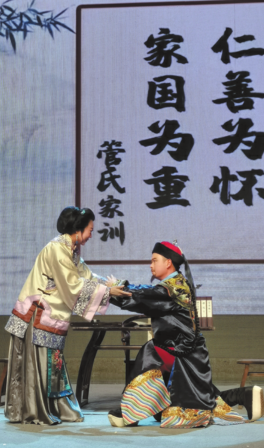
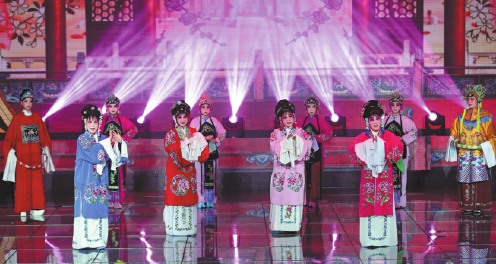
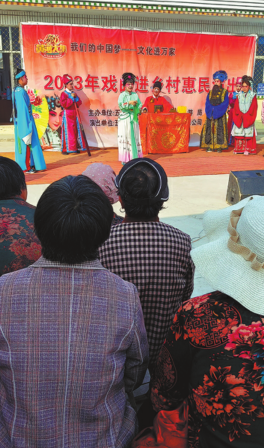
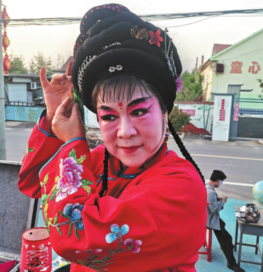
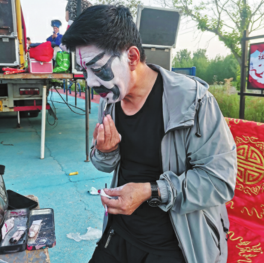
Today's Top News
- Joint Statement on China-US Economic and Trade Meeting in Stockholm
- More grads chart career paths in west of China
- Why China's AI initiative is critically important
- Israel's Gaza takeover plan widely condemned
- S. Korea visa waiver spurs surge in travel interest
- Top cities signal easing to support property market





















